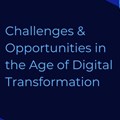Marketing & Media trends
Industry trends
BizTrends Sponsors
Trending
#BizTrends2024: AI integration into CCM is about digital transformation

The growth of consumer facing AI, the whole no code revolution where people can do automations on their own… GhostDraft is already automating customer communications. How much more does modern generative AI models add to your core narrative AI models add to your core offering?
Well, maybe I can start answering your question by telling you briefly how the customer communications field has been changing over the last few years. You know, historically, document automation was a technique that was used in financial departments or the financial industry more broadly To produce invoices and account statements and things like that, which is not that sophisticated in a way, but it saves it's very much a labour-intensive process.
So it stands to save a lot of time and increase the accuracy of what's being produced. But over the last couple of decades – and I would argue at an accelerating pace – something's happened which has changed forever how customers engage with businesses. And, of course, I'm talking about the digital transformation. That little phone in your pocket It's how we do everything these days, right, including shopping, doing business, and the like.
But, you know, it's one thing to buy a pizza on your phone or call an Uber, what happens when you want to buy something more complex, like, let's say, a financial product, like a funeral policy or get a home loan or something like that?
I saw a recent stat that about 2/3 of insurance customers searched online, about the insurance, products that they wanted to purchase, and most of them actually went on to conclude the transaction online. So this is becoming more and more common, these sophisticated, financial transactions that I want to conclude in a digital world.
And this is the need that has driven the evolution of document automation from really just producing, you know, long list of forms into what's now called customer communication management, or CCM.
CCM is essentially the software that automates the production and delivery of all types of written documents, but especially these complex legal or contractual agreements.
It differs from the document automation of the past in several ways, but perhaps most especially in how it can apply quite sophisticated business logic to generate documents on the fly with the appropriate clauses, words, pictures, and so on, in line with the specific customer requirements. And, you know, you might say that in some ways, CCM is becoming the glue between the digital customer And the digital business for these complex financial transactions.
So enter AI into that world. I would say, that there's a there's a lot of confusion, maybe fear, and and I would even say hyperbole when it comes to AI. So, for me, it's helpful to just remind myself of what AI actually is.
At the risk of oversimplifying it, AI is essentially the use of computers to detect or recognise patterns in the data itself using mathematical algorithms
Once it's once it's detected or recognise those patterns, It uses that, to generate predictions, which typically require human intelligence and give the impression that human intelligence has been deployed.
AI really, was used to identify patterns in quantitative data. And having done so, it would use that data to predict all those patterns to predict future events, like the weather or for that matter, you know, what movies you're gonna watch on Netflix next best suited to you.
Generative AI is different. And, you know, over the last year since Chat GPT has become, You know, the word of the year is according to economists. Everything has changed, and there's been this increased focus.
Generative AI can generate new content or data that's similar to, but not identical to, the data that it was trained on. And ChatGPT is a great example. It can generate its own sentences and paragraphs in response to an input question.
And it does this by understanding how similar questions were answered in its training examples. And this then is where this opportunity arises for customer communications. By recognising patterns in customer behaviour, needs, interactions, AI can personalise not just the product offering, but the whole interaction between the business and the customer.
So what does that mean specifically for AI in modern customer communications? Well, let's start with chatbots. We I think we're all familiar with chatbots.
AI powered chatbots can simulate a conversation with a customer. It can give the appearance of understanding simple sentences and providing relevant responses. But sending simple sentences and providing relevant responses.
But beyond that, AI can also simplify complex decision-making processes, analysing the factors that best drive business value, both for the customer and for the business itself.
For example, insurance policy underwriting. I need to decide whether Lindsey is worth insuring based on his risk and what the premium should be related to that or home loan screening.
And then having done this, it can route, the data through a formal workflow, and make sure that the process is that much more accessible and efficient.
We also know that generative AI is useful in writing documents, perhaps summarising or paraphrasing them to make them easier to understand, and that's a very useful feature for many businesses who need to draw up bespoke contracts with customers, to make sure that they, protect the businesses' rights and, by the way, the consumers' rights.
While at the same time making it very accessible from a readability point of view and protect, consumers' rights from that point of view.
So these are a number of different areas where we're seeing AI start to be really deployed in customer communications right now. And if we get this right, you know, the customer stands to benefit quite enormously.
But more than that, by better understanding what customer is actually looking for, and what the specific requirements are, AI can provide more relevant recommendations to customers, ensuring that they receive products and services that are tailored to their needs.
And, of course, as I mentioned earlier, if AI can play a role in delivering cost efficiencies to businesses, those can translate, into potential savings for customers themselves, making products more accessible and affordable to customers themselves.
But there's a lot in that, especially that last bit. And a lot of it is human capital that does not exist in the equation anymore… But a lot of it is also, like, in the role that automation plays in enhancing the customer relationship. So where are the challenges? Where are the opportunities? Then where are the enhancements? And what's happening to the people in the contact centres? Because those cost savings are humans that they don't have to pay anymore.
It's a very good question. I think people are split. Many people are prepared to and, in in fact, eager to work with some kind of AI enabled layer. And many of them are hesitant to do so. And, job losses and the this this apprehension about job displacement because of increased automation, is indeed one of the potential, threats that that that people perceive.
But, actually, I'd say there's a number of others that are important as well. I mean, off the bat, many customers just feel that AI does a bad job of understanding what their specific requirements are and of interacting with them.
In fact, there's this term, AI hallucinations. It's been coined where the AI tool, with all its fancy algorithms, identifies patterns in the data which simply don't exist. They're or even nonsensical.
GPT has told me straight up that I am the editor of Tech Central
I'm sure you've heard of cases where this kind of hallucination, has led to prejudice where, AI has been making discriminatory and there is an example of Amazon who had a recruitment algorithm to help in its selection of staff. And they trained the that, that algorithm in 10 years employment history data.
And because that history was predominantly, male dominated. The algorithm learned to be biased against applications from women and even CVs that, referred a lot to women.
This is something which whenever it's being caught, is highly publicised. And the algorithm developers and practitioners are working very quickly to try and root that up. But this is a complex journey there.
I think we're all add to that, we're all worried about the potential misuse of private data, whether it's a risk of that data being leaked Or, alternatively, that that data is used in some inappropriate way, whether it's to train algorithms maybe a little bit of what I was just speaking about a moment ago.
And then, of course, there's a more philosophical concern that people have with AI more generally is that it's potentially undermining what we may Seemed to be the truth, and we've all heard the rise of deep fakes, which, you know, indistinguishable from the truth.
And more broadly, and we read a lot of this, there's this fear of the unknown, particularly loss of control.
You know, people don't understand a AI. Many people don't understand AI, including many practitioners. And so we we're afraid of more extreme predictions that, you know, AI may go rogue.
It may develop capabilities that may outperform humans. I have to say, in my perception, that many of these predictions are vague, And experts actually disagree on exactly what the risk is associated with all of this.
But having said all of that, what does that mean for us as businesses, who, communicate to customers, what can our responses be, and what are the general measures that can be taken to grow Customers trust in AI.
I think the first, of course, is regulation to control or constrain how and where so used and provide transparency to customers regarding the use of AI. This is very topical. In fact, you're probably aware that as we speak, EU lawmakers are in the midst of marathon negotiations, to put in place a regulatory framework for AI in the EU.
And that framework, early indications are that it may contain a list of all the AI models which are deemed to post what they call a systemic risk, and providers of general purpose AI, will be required to publish summaries of the algorithms and the training content, the content that was used.
But I have to I have to say, and this is my personal opinion, I think a key element which we also need to address going forward is to educate AI practitioners. This isn't just about, working with customers.
This is about working with the people who develop the AI algorithms in the first place so that they design algorithms which Improve collaboration between humans and AI, emphasising the complementarity of their roles rather than the fact that there are alternatives for each other, but not replacing or abdicating responsibility to the computer.
As we see the evolution of search engines like Bing and Google And the extent to which they're increasingly, deploying AI. Users are completely happy to have an AI algorithm do the initial research And present those results to them, and then the user figures out what they're really interested in.
So it's a great combination of the strengths that both can provide together. You know, AI doesn't understand context or nuance the way we do as humans.
They don't understand Hopes and fears the way we and I would say if we allow AI to have unfettered and uncontrolled, unregulated access to run business activities. It's going to miss things like I spoke about earlier. And that's where that's where customer trust will be damaged.
I read recently the words of Kevin Scott, the CTO of Microsoft. Of course, you'll be aware that Microsoft has been deploying AI into its Office products through its Copilot tools.
Yeah. To be honest with you, they do relatively mundane tasks really well. Yes. They're a long way from replacing humans from doing what humans do. But it was interesting to hear what Scott says on this.
He says that is by design, not by accident. He says he expects AI to continue to seep steadily into our lives, but only as fast as humans are able to absorb how this technology ought to be used.
And I think that's a good framework for how we might navigate this AI future in a way that's very much beneficial to businesses and to customers.
So what is the advice that you would have for, like, young people like, starting to choose what career they want to go into, what path they want to follow. What tools must you have in your arsenal to be successful in, like, the new software economy?
Don't get me going on this. I think for me, one of the most valuable things that kids can do at school is do some form of, computer programming, some form of coding, and that is as important, in this country as it is any other country.
And it's what is at the core of our economy going forward and our global economy going forward. If we get this right, we can do many great things. I would argue that for us to deploy AI intelligently, for us to master it, for us to be in charge AI rather than AI being in charge of us.
We need to get to grips with basically how it works. And I'm not saying we need to do a master's degree in AI, but If you don't understand if you don't understand the basics of what a computer program consists of and how to code.
You will not be able to deploy these tools, effectively. Conversely, if I do have that basic understanding, I can make good decisions as to where to deploy AI and for what and, as you say, what prompts to feed it and the likes.
Apart from anything else, coding isn't just about knowing the syntax of a specific computer language, knowing how to write Python commands. It's understanding how a computer thinks. And once I've got that clear in my head, I can design products that are effective for the future.













